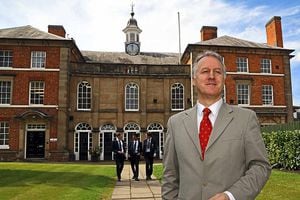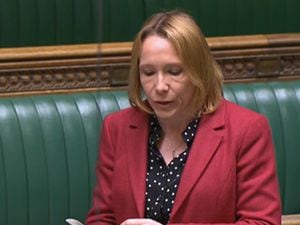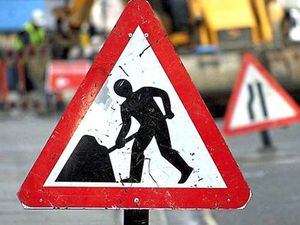Grammar schools are for all, says Shropshire headteacher
Grammar schools are not just for the privileged and wealthy and can play a key role in the communities around them - that is the view of Shropshire headteacher Gary Hickey,

The Adams' Grammar School headteacher has strived since being appointed to the top job at the Newport school to increase the intake from the local area – whatever pupils' background.
The subject is firmly back on the agenda again after Prime Minister Theresa May hinted at giving the green light to a new generation of grammar schools in England.
Mrs May's announcement at a private meeting of Conservative MPs that she wanted a system "with an element of selection" has sparked an outcry among educationalists and opposition politicians.

The man leading the opposition to an expansion of grammar schools is a product of one himself – educated right here in Shropshire.
Jeremy Corbyn attended Adams' Grammar School, a school that has maintained its selective 11-plus status while the rest of the county has turned to comprehensive education.
While Mr Corbyn declines to talk of his education in Shropshire, the debate about the merits of grammar schools continues.
Grammar schools are state secondary schools that select their pupils by means of an examination taken by children at age 11, known as the "11-plus".
There are only about 163 grammar schools in England out of some 3,000 state secondaries, and a further 69 in Northern Ireland.
There are no state grammars in Wales or Scotland and, although some retain the name "grammar school", they are non-selective and have no special status.
Most children in Shropshire attending state schools attend non-selective comprehensive schools or academies.
Adams' Grammar is a selective state grammar school with academy status for day pupils and boarders. It welcomes boys aged 11 to 18 as day boys or boarders and girls aged 16 to 18 as day girls in the sixth form.
During the 1950s and 1960s it was said – mainly by Labour politicians and egalitarian educationalists – that the selective education system reinforced class division and middle-class privilege.
In 1965 the government ordered local education authorities to start phasing out grammar schools and secondary moderns and replace them with a comprehensive system.
A handful of local authorities in England have kept largely selective school systems. In other places, including Shropshire, individual grammar schools survived in areas that were otherwise fully comprehensive.
In 1998 Labour's School Standards and Framework Act forbade the establishment of any new all-selective schools.
It also made provisions for local ballots on the future of existing grammar schools. Only one such ballot has taken place since then. In 2000, parents in Ripon, North Yorkshire, voted by 67 per cent to 33 per cent in favour of keeping Ripon Grammar as a grammar school.
But Mr Hickey said today: "There's a big debate about grammar schools and there's a lot of cynicism boiling up from people who say they're about privilege.
"I think they can be, and some schools certainly have been, but a large part of the privilege argument is about people who can tutor their kids to pass the exam.
"We've put in place ways to reduce that as much as we can, because someone who can afford to tutor their children has an advantage.
"We have horror stories about kids who've been tutored from as young as six-years-old.
"On the day of the test we have kids pulling up on the back seat, with their tutor, doing tests.
"That is child abuse. That's absolutely not what it's about.
"We want to level that playing field, and we're making huge strides in doing so."
Mr Hickey said he had worked hard since being appointed two years ago to change the way Adams' Grammar was perceived in the community.
He said: "When I took over as the head I was very aware that Adams' had been perceived as quite an isolated community on its own.
"Even local residents in Newport thought we were a private school or didn't know we had girls in the sixth form.
"One parent described it as the Willy Wonka factory – it's at the end of the high street, behind the gates and nobody knows anything about it. They thought it was only for the privileged few.
"We changed the admissions policy to give more opportunity to local pupils.
"Last year we were delighted to more than double the intake from the local community into year seven.
"The change in the admissions policy allows us to take pupils that have grammar school ability inside the catchment area to take priority.
"We had something like nine or 10 per cent coming into our year seven from the local area, and we believed there were more people of grammar school ability in Newport. We had to address that balance.
"In the last cohort, we had something like 22 or 23 per cent.
"We're going to maintain that momentum. Realistically, just with the amount of pupils available in Newport – we're never going to have the entire intake just from Newport.
"But if we could get 25 to 28 per cent every year, that will mean there are 30 to 35 per cent across the entire school over a period of years.
"I believe grammar schools are a source of social mobility, I believe they should be part of the community and I do believe it's about offering more than is on the table at the time."
Wrekin MP Mark Pritchard said it was important to make sure children from all backgrounds were able to get into grammar schools.
"We should be making sure more children from poorer backgrounds are able to get in," he said.
"We should also looking at the catchment areas.
"Some grammar schools have very, very wide catchment areas, a lot of local pupils are excluded and yet pupils are bussed in from miles around from other counties.
"I am not convinced that it will get through the Commons if it is just expanding grammar schools for grammar schools sake."
Education Secretary Justine Greening yesterday confirmed the Government believed selection "can play a role" in the future of state education.
But Ms Greening told the House of Commons there would be no return to the "simplistic" division of children into "winners and losers" at the age of 11.
And Cabinet colleague Sir Michael Fallon, whose own constituency in Kent saw the opening of the first new grammar for half a century last year, denied that youngsters who miss out on selection will be consigned to "sink schools".
But the Government's social mobility tsar Alan Milburn warned that grammars could be "a social mobility disaster", while charity Teach First said: "Education experts are united that the evidence shows grammar schools harm social mobility.





